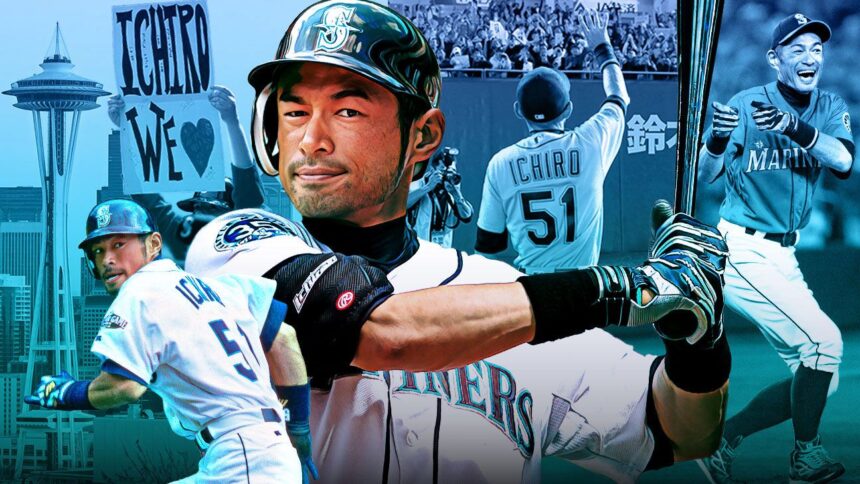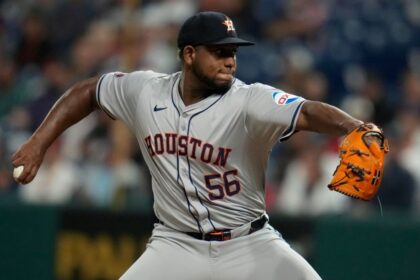Ichiro Suzuki: A Hall of Fame Forged in Legend
The baseball world celebrates Ichiro Suzuki’s induction into the Hall of Fame. His selection, based on more than two decades of excellence, both in Japan and MLB, was a deserved recognition of a legend. But Ichiro’s story goes beyond his impressive 3,089 hits and a batting average of .311 in 19 seasons in the Major Leagues.To commemorate this moment, we have gathered testimonials from former teammates, rivals, and other prominent figures in MLB, who share their experiences playing with, against, and simply witnessing the greatness of Ichiro.
Ichiro’s First Impressions

“I heard Bobby [Valentine] talk about this really good player who could play here in the Major Leagues. Ichiro was the first Japanese position player to arrive, so nobody knew if they could succeed here in the Major Leagues. And I remember the first time I met him in the Seattle clubhouse, he knew who I was and I didn’t immediately know who he was. And talking to Tom Robson, who is the batting coach, he said that Ichiro is bigger than Elvis in Japan, just to give me a frame of reference. And even so, as big as he was in Japan, there was still doubt as to whether position players could compete here”.
John Olerud, former Mariners teammate, 2001-2004
“My favorite story was his first year in spring training. Our manager was Lou Piniella. Ichiro was hitting foul balls over the third base dugout and over the third baseman, and he was getting a lot of his hits between first and second, short and third, and over the shortstop’s head. And one day Lou got angry. He was standing on the top step, and Ichiro was coming back to the dugout. I think he had hit an out by ground ball or something like that. And Lou always let out everything he wanted to say, and he spoke so loudly – I’m sure Ichiro heard him – he asks our bench coach: ‘Can this f—ing guy throw the ball once?’. And sure enough, in the next at-bat, he got up there, and hit a home run to right field. He turned around the bases without any animation or anything, with the same dry face he always has with his sunglasses on, then took off his helmet, took off his gloves, put his bat in his bat rack, his personal bat rack that was in the dugout, and sat down and said: ‘How about that?’ And everyone died laughing”.
Mike Cameron, former Mariners teammate, 2001-2003
Jeremy Bryant, chef of the Mariners for more than 20 years, remembers how Ichiro, upon arriving, asked him if he had cheeseburgers. Although Bryant did not expect that request, adaptability was key. Ichiro developed a taste for Mexican-style marinated chicken wings, which he ate religiously before each home game. On travel days, he preferred two corn dogs. Ichiro’s impact quickly spread to his teammates and team staff, but he also had to prove his worth to the rest of the league. His performance in 2001, where he won the MVP and the American League Rookie of the Year award, was crucial.“We had no idea how to take it at first. Now I had a teammate with his first name on his back. Nobody had seen that before. He had his own program and BP and stuff, and everyone knew his credentials in Japan, but I had no idea how it was going to translate. And he went through spring training like a pro. The guys would ask him to do this and that. And he would look at you like: ‘No, I know what I’m doing.’ And he had an acceptable spring, still everyone waiting to see what he was going to do and he came out firing, bang. And that was the first season, it was incredible. He gave me rice balls every day. He was great and fit in really well in that dynamic. I mean, it was a strange year for all of us because the Japanese press was here and it was almost like having a postseason press conference every day”.
Bret Boone, former Mariners teammate, 2001-2005
“I remember seeing him for the first time and how small he was. He wasn’t a big guy. My thought was, ‘Okay, it’s going to be interesting to see how this turns out.’ He’s a right fielder. Most right fielders are big guys, power guys. He was of such a slender build but had all this amazing talent, and he could be whatever he wanted. And his arm, I mean, it was phenomenal. He had a cannon in the outfield and just the grace with which he did things, whether it was charging the ball and his footwork and being able to make that perfect throw every time or running the bases. He just glided, and he just did it all with a grace. That was really rare to see”.
Tim Salmon, Angels rival, 2001-2006
Mike Sweeney, who played with and against Ichiro in the American League, remembers their first encounter in 2001. After Ichiro hit a single, Sweeney congratulated him, and Ichiro’s response was unexpected, demonstrating his command of English and his personality.“I really believe he could look at the field and decide where he wanted to hit the ball and then he would hit it in a way that it would fall in front of the outfielders. Although he had power in his bat, he knew how to hit it over the infielders, almost as if his bat was a fungo, and as if the pitcher was throwing it up in the air and he was hitting it somewhere; it was really exasperating to defend him.”
Joe Maddon, former manager of the Rays and the Cubs (and bench coach of the Angels in 2001)
Chris Rusin, Rockies pitcher, who allowed Ichiro’s 3,000th hit, and Christian Yelich, former Marlins teammate, share their perspectives on the admiration they felt for Ichiro, even from a young age.“He drives the game with a hit to the line to left center field for a single and reaches first base, and the only thing he could think about was when he was in Japan playing against the Japanese stars, every time an American hit a single on the scoreboard it would be a big graphic, almost like a Batman and Robin graphic from the 50s/60s. Like ‘¡Pow!’ or ‘¡Boom!’ And he would say: ‘Good hitting’. And over the loudspeaker, you would hear the PA announcer say: ‘Good hitting’. And you would see these big graphics on the scoreboard. So, being a kid from Southern California who doesn’t speak Japanese, I don’t know what to say to Ichiro. I don’t even know if he speaks English. He had just arrived here in spring training. So I look at him and pat him on the back and say: ‘Ichiro, good hitting’. And I don’t know what kind of response I’m going to get. And he looks at me – I’d never seen him before – and says to me: ‘Mike Sweeney, good ass’. And I burst out laughing. I say, my God, his English is perfect. No accent. And I say, my God, this guy, he’s going to be great”.
Mike Sweeney
Ichiro’s Front-Row Spectacle
Randy Winn, who batted right behind Ichiro in 2004, when he set a record of 262 hits in a season, describes his position as a “pleasure.” Winn benefited from the energy that Ichiro absorbed from opposing pitchers.Winn also recounts how, in a conversation, Ichiro revealed his daily goal: “Five”. Ichiro wanted five hits in each game, a mindset that explains his success.“He had three months of 50 hits. I’m lucky to have one in my career, and I felt like I was falling out of bed every day with two hits in my pocket. It was incredible. I mean it. You went to the park every day like: ‘Oh, do I already have two hits? Wow, this game is easy’. He did it three times in a year! I can’t even imagine it. That for me is so mind-blowing that I can’t even express it in words”.
Randy Winn
Unforgettable Moments

Ichiro’s throw from right field to get Terrence Long at third base is another example of his exceptional ability.“The atmosphere was crazy. You could feel that the crowd was expecting something because for a Miami-Colorado game to have quite a few fans there, and it got pretty loud when he went up to the plate. You could feel it a little bit. I think I got him 2-0 and then left a cutter over the middle of the plate. He got away from it, hit the end of the bat, and it traveled further than I thought it was going to go, and the outfielder kept going and going and going. I was like, ‘Please don’t go out. Just not a home run. I’ll take anything but a home run.’ And it went against the wall and ended up getting a triple, and I think I ended up getting out of the inning. But yeah, whenever you faced a hitter like that in a big situation where he had something on the line or whatever, you didn’t want to be a part of it, but as long as it wasn’t too bad, it’s okay. It’s not bad to be a part of it. Then, after the game, I’m sitting in my locker and I have all the media around me wanting to talk about giving up that hit, and I explained everything and then at the end I said, ‘The only thing I asked is that you go back and ask him for an autographed bat. By the time he leaves, you just have to send it.’ And by the time I left the stadium, I had already sent the bat and had it signed. A great guy”.
Chris Rusin
Even routine plays became legends with Ichiro on the field, as demonstrated by Tim Salmon’s anecdote about a batted ball that hit him.“When he got me out at third, at the beginning of the year we were in Seattle, the same scenario, the ball hit to right field, but it was a little more towards the gap, and I went from first to third, no problem. So this time I’m thinking, ‘Okay, I went from first to third once before’, but this time I was right on it. And I saw the replay. I had already taken three or four steps past second base before he caught it. So I’m thinking, there’s no way he’s going to get me out, and I’m running, and then you can look in the third baseman’s eyes and you can see that he’s looking at the ball. And I say to myself, I say, ‘Okay, this ball is about to pass me’. So I thought, two things are going to happen. Either way, you’re going to be on ESPN forever. So the smartest thing to do is just slide, just to make it look close. The worst thing I could have done is just run in, stand up, and it would have been even more embarrassing. So I said, ‘I’m going to slide’. But as soon as I got ready to slide, you see this ball go right by me. I said, ‘Oh my God, there’s no way he just made that throw'”.
Terrence Long
Joe Girardi, former Yankees manager, recalls a home run by Ichiro against Mariano Rivera, demonstrating his ability to hit the ball with power.“We were playing in Seattle one year, and the grass always has dew, a moisture. Anyway, I hit a ball. This goes along the lines of how hard he hit the ball. They just shot off his bat. And it was going to be an easy ground ball single. And I went to catch it, and it hit the ground and bounced so hard. I didn’t get my glove down in time, and it hit me in the nuts. And, literally, I did everything I could to avoid rolling or whatever. I mean, I caught the ball and threw it and said, ‘Oh my God.’ And I was walking around the outfield and I swear it was burning down there. I figured I must be bleeding. And I kept trying to look down, looking at it like, ‘Am I bleeding? I’m 200 feet away. That ball, it hit the ground and had so much force. It looked like a normal hit, a bounce, and it bounced off me, but he hits the ball so hard that you really have to be aware. And I remember hearing infielders talk about that. He would hit a hard one or two-bounce hit that would just go right past, in front of the infielder, because the ball came off different”.
Tim Salmon
Legendary Skills and Work Ethic
Ichiro’s combination of skills and work ethic set him apart. Mike Cameron highlights his consistency and his constant pursuit of improvement.Mark Teixeira, former Yankees teammate, highlights his work ethic and dedication.“He was my locker mate and was my right fielder for the three years we played together. What stands out the most is his consistency. His consistency and his work ethic. He calls it a word in Japanese: it’s called kaizen, and in Japanese that means endless [or continuous] improvement. So he was never satisfied. And I don’t think he really worked with the numbers apart from the fact that he loved the idea of getting hits. The guy was driven by getting hits, and obviously that’s evident in that he came here and played all those years and got 3,000-something hits and has the all-time hits record in a season. So he was driven by that, even though he had the ability to hit the home run, which I don’t think everyone really knew. The guy used to go even on off days and train. It was every day for him. That’s all he knew. I always asked him, ‘What drives you to do this kind of thing?’. He says, first of all, that his name means ‘the one’. So he’s destined to be this one person. And he was also very particular with everything he did, from his bats to having his own special bat case with a humidifier in there. He was a competitor”.
Mike Cameron
Girardi highlights his durability and skills in all facets of the game.“I had the opportunity to see Ichiro at his best. There were only a handful of baseball players that I thought were more impactful to the game. I just thought he was one of the top five players in all of baseball when I played against him. What impressed me the most is that he worked harder, took his job more seriously than anyone I’ve ever played with. And this is a guy who was a Hall of Famer, a legend in Japan. He could have retired. He wasn’t even playing every day, but nonetheless, he took his craft more seriously than anyone”.
Mark Teixeira
Mark Buehrle, who faced Ichiro, remembers his ability to put the ball where he wanted.“I think his durability was absolutely incredible. He got here at 27 and really played every day until he was 41. It was incredible. I’m looking at his stats when he was 41. He appeared in 153 games, and he worked really hard. There are really three facets of the game, and he was very good at all of them. Offensively, just his hitting skills were absolutely incredible and [he had] the ability to hit a home run -in a sense- when the team needed it”.
Joe Girardi
Terrence Long highlights Ichiro’s power in batting practice, something that many underestimate.“He was so good at making contact and just putting the ball where he wanted. I remember a game – I think he had all the hits during that game – he got to first base after his third hit, and I had run to cover. It was like a hit through the right side of the infield. And I went to cover and he was standing on first base, and I just threw my arms up. ‘Are you f***ing kidding me?’. And he did his whole, ‘Sorry,’ shrugging his shoulders. But he was so good at putting the ball where he wanted. I swear he put it where the guys weren’t. I think the only time I moved the infielders around was against him. There was a game, he got two hits between third and shortstop. And I remember in the third at-bat. I looked at [third baseman Joe] Crede and said, ‘Move, he hits the ball right there every time, move’. So I signaled him to move towards shortstop and what does Ichiro do? He hits it right down the line, right where Crede would be. And I go, ‘Yeah, I’m not moving anyone ever again'”.
Mark Buehrle
Bob Melvin, who was Ichiro’s first manager, recounts how Ichiro took his job so seriously that he even refused to take days off.“He just hits, hits, hits, but what impressed me most about that guy was the batting practice. His first rounds, he’s just working on his lines, and then his last round of BP, he hits balls further than anyone I’ve ever seen. And still today, people don’t believe it. I’ve seen him take BP many times. He hits the balls further than any of the greats you can name from that era in batting practice”.
Terrence Long
Unique Personality
Ichiro was known for his sense of humor and his unique style, as demonstrated by the “kangaroo court” incident.Jerry Dipoto, Mariners’ president of baseball operations, recalls Ichiro’s arrival in 2018, with a casual style that only Ichiro could pull off.“So Ichiro stands up very calmly and begins to speak very eloquent Japanese with a calm and very distinguished cadence. And then the translator says: ‘Ichiro-san wants to know how much we are going to fine him for making us see all the shit that you guys put on every day’. It was in September, I think everyone who was on the 40-man roster was there, and the whole room exploded”.
Raul Ibanez, former teammate of the Mariners and the Yankees
Boone recalls a funny moment with a referee, showing Ichiro’s humorous side.“I would be conservative in saying that I believe he’s wearing a suit that’s about $20,000, with perfectly coiffed, jet-black hair, and he’s wearing the nicest pair of sunglasses I’ve ever seen in my life. He walks in and throws his arms out and says, ‘Jerry!’. I looked at him, and my first instinct, I gave him a little slap on the chest. I said, ‘I thought we were going casual’. And he looked at me and laughed. He said, ‘This is casual for me, pal!'”.
Jerry Dipoto
Sweeney recounts how Ichiro captivated the baseball stars in his first All-Star Game, demonstrating his ability to speak up and lead.“One of my favorite moments was: I was leaving for Opening Day and the second base umpire [Kerwin Danley] was following him to right field, and everyone thought [Ichiro] didn’t speak English. And I think the phrase he blurted out because Danley came straight to me and said, ‘I can’t believe what Ichiro just said to me.’ I said, ‘What?’. He said he was passing by Ichiro and gave him the ‘Hey, good luck’ this and that. And Ichiro looked at him and said, ‘What’s up, dude?’. and kept running to right field. That stuck with me. That was funny. That’s how he was”.
Bret Boone
“Joe Torre [AL manager] gives this beautiful speech, you know, ‘You are the best in the world in this locker room. Look around you. You are in an elite class. There are only 70 people in the world who are going to play in this game tonight, and you are one of them.’ And you look around, you see Derek Jeter and Mariano Rivera, and you look around and you say, ‘My God, this is great.’ So in the end, we are all in this feeling that you are in a cathedral, but at the same time you are in a baseball locker room, and you say, ‘where are we going to go from here?’ And Joe Torre says, ‘Does anyone have anything to add?’ And we’re like, how can you top Joe Torre? And we look around and Ichiro stands up, raises his hand – where is he going with this? And he says, ‘We’re going to kick their asses.’ And the place just erupted, the whole locker room. It was something I will never forget. So every year in the All-Star Games that followed, it was like, okay, whoever the manager is, you can say whatever you want, but No. 51 always has the last word. And it was something tacit – you look and you see Jeter, the greatest players of our time. And when the manager finished, it was like, okay, that was good, but wait to hear what Ichiro has to say. He has the last word”.
Mike Sweeney











